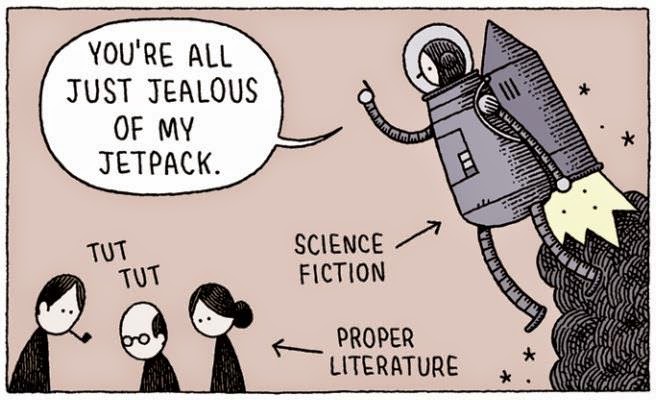
Do you want to learn more about writing, including receiving marketing tips and tricks, deals on valuable workshops and retreats, and time management hacks? Join the VIP Writer’s Club!
Become a VIP Reader!Interested in free books, exclusive bonus content, and VIP early access to Jess’ upcoming projects? Then sign up here to become a VIP Reader.
Fiction Genres, Part I: Transcending the Genre
If you walk into a bookstore, you'll see genre fiction separate from literary fiction. Genre fiction (also called commercial and mainstream fiction) is comprised of these subcategories: mystery/thriller, romance, westerns, horror, sci-fi/fantasy, and young adult. It is generally viewed as books for the masses, while literary fiction is considered more highbrow.
Can we stop with that?
I'm gonna call this elevation of literary fiction "genreism," an elitist holdover dictating that a certain class of books (one that can be largely inaccessible because of subject matter, or because its pacing makes it difficult to read them between shifts, or for a host of other reasons) is better than another. I'm not knocking literary fiction. There's some truly awesome lit fiction books out there (I just read Adiche's Americanah and highly recommend it). What I am doing is taking the idea that any single genre is better than another, hitting it over the head with a shovel, and burying it.
Because here's the deal: literary fiction IS just another genre.
It is a genre that relies more on character than plot, that includes themes and symbolism and speaks to the human condition, but that is mostly defined more by what it isn't than what it is. Literary fiction is not horror, though what is Mary Shelley's Frankenstein without a monster? Literary fiction is not romance, but what is Jane Eyre without passionate love? Literary fiction is not science fiction, but how else would you describe Orwell's 1984? Literary fiction is not mystery, but The Big Sleep without murder and blackmail really would be sleep-inducing.
Some might argue that these examples "transcended their genre," as if the authors set out to write a horror/romance/sci fi/mystery novel and accidentally wrote a really good book instead. I would argue that every novelist tries to write the best book they can, and that genres--including the genre of "literary fiction"--are useful for organizing conversations, catering to moods (sometimes you just wanna read a romance), selling books, and nothing else.
Because I'm teaching a class on genres in Boston in February, and because I write across genres (mystery, fantasy, young adult, and lit fiction) and am trying to figure out what exactly that means, and because this is important (genreism stifles reading and writing), I'm going to break it all down.
My next post will provide a definition and examples of literary fiction, romance, westerns,
horror, sci-fi/fantasy, and young adult, and the post after that will break the mystery/thriller category (near and dear to my heart) into its sub-categories. If you would like subcategories for the other genres, you can find a great list here.
The lists will not be definitive, and feedback (as well as reading recommendations in each category) is welcome!
(And I have to sing this from the rooftops--my Kickstarter campaign to publish my magical realism novel The Catalain Book of Secrets has met its funding goal! Thank you thank you thank you! https://www.kickstarter.com/projects/1675834533/the-catalain-book-of-secrets)
Join the Discussion |





